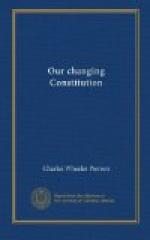[Footnote 1: 1 Cranch, 137.]
[Footnote 2: 5 Cranch, 115, decided in 1809.]
In the following year (1810) came the case of Fletcher v. Peck,[1] in which for the first time a statute of a state was held by the Supreme Court to be void as repugnant to the Federal Constitution. The State of Georgia had sought by statute to destroy rights in lands acquired under a previous act. It was held that the statute was unconstitutional as impairing the obligation of contracts within the meaning of the Constitution.
[Footnote 1: 6 Cranch, 87.]
In Martin v. Hunter’s Lessee[1] was asserted the right of the Federal Supreme Court to overrule the judgment of a state court on questions arising under the Federal Constitution. The State of Virginia had denied that right and the Supreme Court reversed the judgment of the Virginia Court of Appeals.
[Footnote 1: 1 Wheat., 304 (1816.)]
In McCulloch v. State of Maryland,[1] a case involving an attempt by the State of Maryland to tax the Bank of the United States, Marshall’s doctrine of implied powers was elaborated, and the judgment of the state court upholding the tax was reversed.
[Footnote 1: 4 Wheat., 316 (1819).]
In the Dartmouth College case[1] the doctrine of the inviolability of contracts against attack by state legislation was further developed. An act of the state legislature of New Hampshire had sought to alter the charter of Dartmouth College, and the New Hampshire courts had upheld the legislature. The Supreme Court reversed the state court and declared the statute unconstitutional under the clause of the Constitution which declares that no state shall make any law impairing the obligation of contracts.
[Footnote 1: Dartmouth College v. Woodward, 4 Wheat., 518 (1819).]
In the great case of Gibbons v. Ogden[1] the Court asserted the paramount jurisdiction of the National Government over interstate commerce. This was one of the most important and far-reaching of all Marshall’s decisions. An injunction had been granted by Chancellor Kent and unanimously sustained by the Court of Errors of New York, restraining Gibbons from navigating the Hudson River by steamboats




